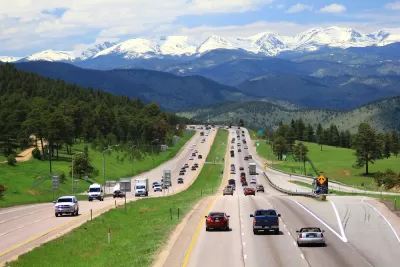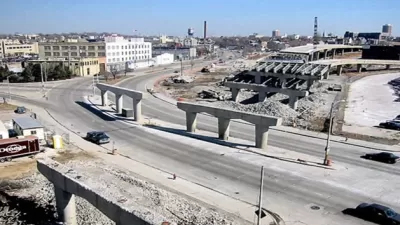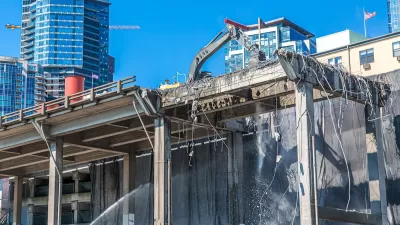While the department has canceled some road expansion projects, the agency has no plans to remove highways, calling them the “bread and butter” of the state’s transportation network.

Don’t expect Colorado’s Department of Transportation (CDOT) to begin any major highway removal projects in the foreseeable future, writes Nathaniel Minor for Colorado Public Radio. A new state law requires the CDOT to shift funding priority toward projects that would decrease greenhouse gas emissions from the state's transportation systems.
In an interview with Colorado Matters host Ryan Warner, CDOT Executive Director Shoshana Lew said “Highways are incredibly fundamental to what CDOT does,” calling the highway system “the bread and butter that connects a very large state and allows different parts of the state to connect to one another.” Lew added that “CDOT is also committed to broadening travel choices by boosting public transportation service and traffic-calming ‘complete street’ rebuilds to better serve pedestrians, cyclists and transit riders.”
Lew also spoke on the state’s Bustang and Pegasus transit services, which shuttle people to the mountains, the benefits to neighborhoods of removing old viaducts in Denver, and why CDOT is adding toll lanes to some of the state’s roads. Overall, Lew focused on the agency’s goal to “give people as many choices as possible.”
Addressing criticism that CDOT contracting policies privilege large companies over smaller, local businesses, Lew noted that the scale of some projects makes them unfeasible for smaller companies. “[T]he contractor that's going to have the skill set to do a big project like a rebuild on I-25 is probably not the same one that's going to do a rural guardrail project.”
FULL STORY: CDOT may be slowing highway expansions, but don’t expect any highway removals

Alabama: Trump Terminates Settlements for Black Communities Harmed By Raw Sewage
Trump deemed the landmark civil rights agreement “illegal DEI and environmental justice policy.”

Planetizen Federal Action Tracker
A weekly monitor of how Trump’s orders and actions are impacting planners and planning in America.

Why Should We Subsidize Public Transportation?
Many public transit agencies face financial stress due to rising costs, declining fare revenue, and declining subsidies. Transit advocates must provide a strong business case for increasing public transit funding.

Understanding Road Diets
An explainer from Momentum highlights the advantages of reducing vehicle lanes in favor of more bike, transit, and pedestrian infrastructure.

New California Law Regulates Warehouse Pollution
A new law tightens building and emissions regulations for large distribution warehouses to mitigate air pollution and traffic in surrounding communities.

Phoenix Announces Opening Date for Light Rail Extension
The South Central extension will connect South Phoenix to downtown and other major hubs starting on June 7.
Urban Design for Planners 1: Software Tools
This six-course series explores essential urban design concepts using open source software and equips planners with the tools they need to participate fully in the urban design process.
Planning for Universal Design
Learn the tools for implementing Universal Design in planning regulations.
Caltrans
Smith Gee Studio
Institute for Housing and Urban Development Studies (IHS)
City of Grandview
Harvard GSD Executive Education
Toledo-Lucas County Plan Commissions
Salt Lake City
NYU Wagner Graduate School of Public Service





























